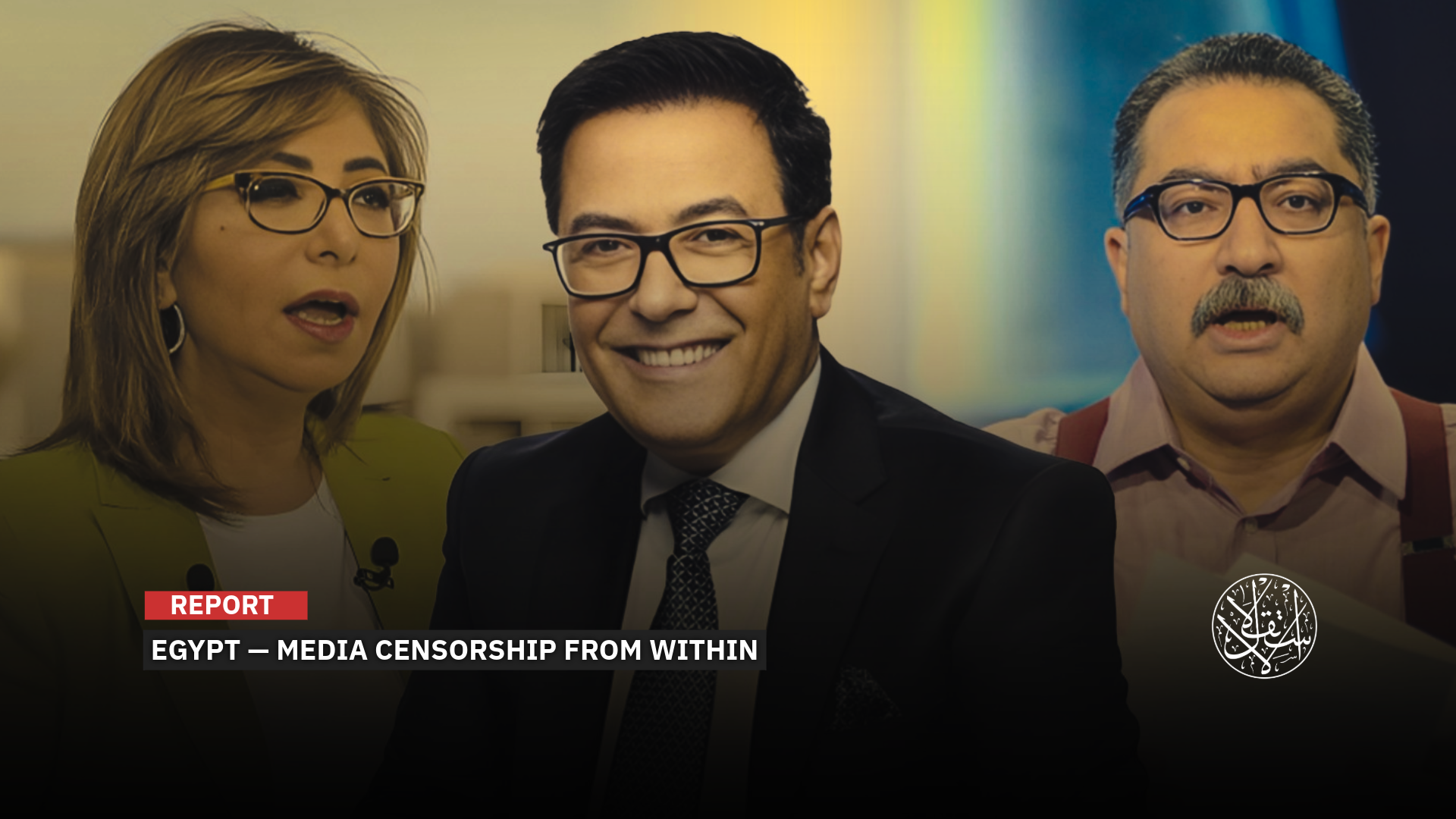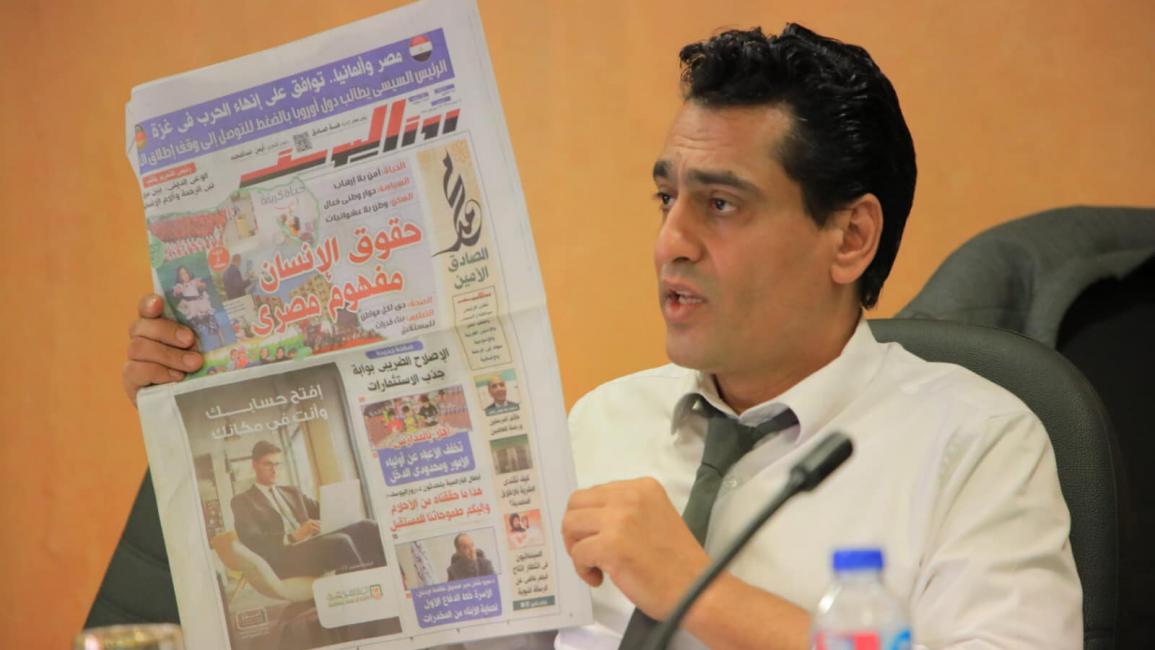Behind Egypt’s Talk Show Shake-Up: Reshuffle or Score-Settling?

"Anyone who doesn’t fully align with the official narrative is excluded without discussion."
Egypt is currently experiencing an extremely tense political and social moment, amid rising public anger triggered by a wave of successive disasters. In response, the regime has begun implementing a process of reshuffling the media landscape.
The removal of three of the most prominent talk show hosts, Ibrahim Eissa, Lamis Elhadidy, and Khairy Ramadan, marked a new peak in an accelerating effort to restrict public space, even targeting figures known for their loyalty in promoting the official narrative.
These dismissals, along with the silent changes that followed across print journalism and online platforms, cannot be separated from the widespread public outrage sweeping Egyptian streets in the wake of a series of horrific road accidents.
One such tragedy was the Regional Ring Road crash, which claimed dozens of innocent lives and sparked an unprecedented wave of anger that reached Transport Minister Kamel al-Wazir, one of the regime’s most prominent figures and among the closest to Head of the Egyptian Regime Abdel Fattah el-Sisi.
At a time when public frustration continues to grow over the deepening economic crisis, rising prices, and the erosion of the national currency’s value, Egyptians have found themselves facing a striking paradox.
The paradox is that the media, which had long justified every official failure, is now itself being held to account for its leniency or for crossing supposed red lines, even when merely relaying citizens’ testimonies or indirectly suggesting the responsibility of certain state actors.
Under this growing pressure, even media personalities who for years reinforced the official narrative are no longer allowed to stray from the script, not even briefly.
Some were removed, while others were forced into silence or compelled to leave through so-called settlement agreements. In the meantime, the state security apparatus is redrawing the media landscape, not only to preserve the image of the state but to shield it from any form of accountability, even when such questioning arises from within state-run institutions.
This moment has sharpened urgent questions about the intersection of media repression and mounting social unrest. Why is public anger denied an outlet? Why is the media forbidden from showing even the slightest solidarity with the people, even from within the very institutions controlled by the state?
Timing of the Dismissals
Between mid-June and mid-July 2025, United Media Services, a company directly affiliated with the General Intelligence Service, removed three of Egypt’s most prominent talk show hosts: Ibrahim Eissa, Lamis Elhadidy, and Khairy Ramadan, all at once.
The move appeared to be part of a broader, large-scale reshuffling of the official media landscape, following repeated government failures and structural crises in public infrastructure that left state media exposed to public criticism.
Although many Egyptians welcomed the decision, especially since some of the three hosts were accused of promoting rhetoric hostile to Islamic identity or aligning with Israeli Occupation narratives, particularly Ibrahim Eissa, the unclear timing of the dismissals raised questions about the true motivations behind such a sudden decision.
This change occurred before the regular media ended and without the usual wait for summer programming adjustments.
Early signs of the transformation emerged when the channel al-Kahera Wal Nas quietly ended its contract with Ibrahim Eissa after years of controversial programming. Eissa is known for his outspoken criticism of Palestinian resistance movements, particularly Hamas, and his public support for the Israeli narrative.
This move coincided with Eissa’s launch of a YouTube channel where he began presenting content that, although indirect, was critical of certain Egyptian government policies, a precedent his audience had not seen in many years.

Reshuffling
The next move involved Lamis Elhadidy, whose contract with ON TV was terminated on July 16 after she crossed the editorial red line by discussing the responsibility of army-affiliated companies for road projects that witnessed deadly accidents, including the horrific Regional Ring Road crash in Monufia Governorate, which claimed the lives of 19 young women.
Although the official statement merely cited a “non-renewal of the contract,” the context suggests the real reason was her overstepping the boundaries of criticism permitted even within pro-government media.
As for Khairy Ramadan, his removal was even more abrupt. His show “Ma’a Khairy” (With Khairy) was cut off during a live broadcast on July 6, after he hosted truck drivers who spoke about the poor condition of roads and the frequency of accidents. The program has not aired since.
Commenting on this wave of dismissals, Sarah Qaddah, Regional Director for the Committee to Protect Journalists (CPJ), said, “What happened reveals the extent of the regime’s intolerance toward any media coverage that strays from the approved political narrative, even within state-run channels.”
In a statement issued on July 22, she noted that this strict censorship environment “reflects the deep erosion of press freedom in Egypt.”
“What is happening is clear evidence that Egyptian media has become a full-fledged tool for promoting the official narrative, leaving no room for any critical or divergent voice, even if it belongs to the system itself,” Qaddah added.
Observers point out that this fundamental reshuffling of the regime’s media arms comes amid intensifying internal crises and the collapse of official narratives in several key areas.
Foremost among these are infrastructure projects implemented by military-affiliated companies, which are now causing disasters that can no longer be justified to the public.
A Hidden Ministry
This has prompted state apparatuses to tighten their grip further by eliminating voices that did not fully conform to the rhetoric of denial or justification, even if they belonged to the traditional circle of loyalty.
International organizations warn that the media landscape in Egypt has become one of the most restricted in the Arab world, as the country continues to decline in press freedom rankings since 2013.
At the same time, United Media Services is increasingly operating as a kind of hidden Ministry of Information, managed by the intelligence services. It does not merely direct the messaging but actively redraws the entire media landscape.
Egyptian writer Ismail Hosny stated that the termination of contracts for Ibrahim Eissa, Lamis Elhadidy, and Khairy Ramadan is not just an administrative decision but a blunt political message: “Everyone must be silent. No more criticism.”
In a post on X on July 17, Hosny argued that the state is reengineering the media with a logic of blind obedience, as if the path to reform can only begin by silencing everyone.
A Grave Mistake
The wave of dismissals extended beyond television figures to include influential roles in print journalism, as evidenced by the abrupt removal of journalist Ayman Abdelmeguid from his position as editor-in-chief of the Rosa el-Youssef website on July 16, 2025, nearly two years ahead of his scheduled term ending in April 2027.
Although the National Press Authority appointed journalist Ahmed Embaby as his successor, the behind-the-scenes details of the dismissal reveal a strict censorship environment that does not tolerate what it considers any breach of the official narrative.
Abdelmeguid was removed following what was described as a “grave professional error” after the publication of a report titled “Rabaa al-Adawiya Mosque in Cairo: A Religious Landmark and a Historic Event,” which included a paragraph published during Ramadan in March 2025.
The passage that triggered the backlash read, “Rabaa Mosque gained wider fame when it became a global focal point due to the sit-in held by supporters of President Mohamed Morsi ahead of the military takeover.”
Although the paragraph remained online for over three months without detection and was later removed as soon as journalists began circulating it in WhatsApp groups, this did not shield Abdelmeguid from accountability.
Despite his long tenure at the paper and his status as a three-time elected member of the Journalists’ Syndicate Council, most recently with over 2,400 votes, he was still held directly accountable because of his position.
This incident illustrates that the grip of media censorship does not spare even loyal or trusted figures if they dare to deviate from the “official version” or show any degree of editorial independence, even if done in good faith or unintentionally.
Thus, the contours of “Egypt’s new media reshuffle” are becoming clear, where even the most loyal figures are no longer safe if they fail to fully conform to the approved framework or allow any content that reflects historical reinterpretation outside the state’s oversight.

The Minister’s Fury
Egyptian journalist Hassan Amer said that “the rigid reaction of Transport Minister Kamel al-Wazir following the Regional Ring Road disaster reflected a dangerous paradox in how the regime handles crises.”
“The voice of the minister’s anger rose above all others, while the voice of pro-government media fell silent, and those who tried to approach the realm of accountability were silenced,” Amer told Al-Estiklal.
“The minister, once considered among the top candidates to succeed the prime minister, confronted the national tragedy not with an apology or by taking responsibility but with a public insistence on staying in office, saying, ‘I will not leave it and walk away. I will stay here until I die.’”
“Many saw this as a provocative and confrontational statement, one that reflects a complete disconnect from the growing public frustration caused by deteriorating services and infrastructure and worsening economic and living conditions,” he added.
“While the minister defiantly holds onto his position despite public anger, media figures are being sidelined entirely for merely stepping slightly outside the bounds of permitted discourse or hinting at government failures.”
“This is what happened to Ibrahim Eissa, Lamis Elhadidy, and Khairy Ramadan, and before them during discussions of the economic crisis, to Ahmed el-Tahry, Tawfik Okasha, Qaswaa al-Khalali, Gaber el-Qarmouty, and the list goes on. The message is clear. Anyone who does not fully align with the official narrative is excluded without discussion,” the journalist said.
“What is happening is not merely a reshuffle of the media. It is a targeted political purge that confirms the regime will not allow any alternative narrative, even if it comes from within.”
“Anyone who tries to break this symbolic monopoly is punished immediately. At the same time, the regime’s voices like Ahmed Moussa and Nashaat al-Dihy are allowed to shout above everyone else without any accountability,” according to Amer.
Sources
- Egyptian Intelligence Suspends Programs of Broadcasters Who Criticized the Government, What Did They Say? [Arabic]
- Editor-in-Chief of Egypt's Rosa el-Youssef Dismissed Over Use of the Word 'Coup' [Arabic]
- United Media Services Terminates Ibrahim Eissa, Khairy Ramadan, and Lamis Elhadidy for Crossing Red Lines in Criticizing the Government [Arabic]
- Amid Widespread Criticism and an Attempt to Calm Public Anger, Does the Road Accident Crisis in Egypt Reduce Kamel al-Wazir’s Chance of Becoming Prime Minister? [Arabic]










